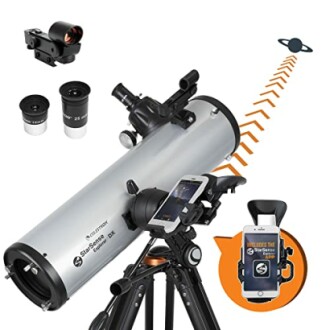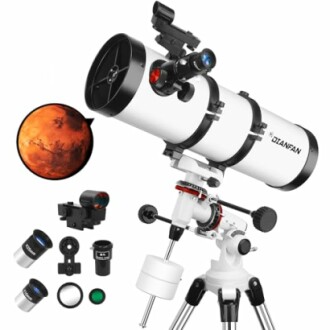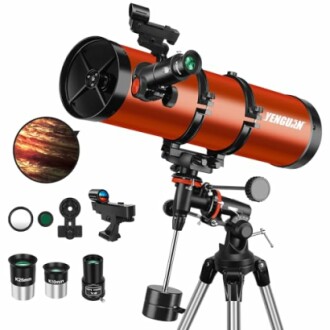
Top Reflector Telescopes for Beginners
- Reflector telescopes are ideal for beginners due to their ease of use and effective light gathering.
- These telescopes provide excellent views of planets and other celestial objects.
- Key features to consider include aperture size, mount type, and accessories.
Reflector telescopes are popular for beginners interested in astronomy. They offer a user-friendly experience and are excellent for viewing planets and other celestial objects. In this guide, we will highlight the best reflector telescopes geared towards newcomers in the field. This includes important features, what to look for, and some top product recommendations to help you make an informed decision.
Why Choose Reflector Telescopes?
Reflector telescopes utilize mirrors to gather and focus light, which allows for larger aperture sizes compared to refractor telescopes of similar price. This results in brighter and clearer images. Additionally, they tend to be more affordable for larger apertures, making them a great choice for beginners.
Key Features to Consider
- Aperture Size: Bigger aperture means better light-gathering ability.
- Mount Type: Choose between altazimuth and equatorial mounts based on ease of use and tracking capabilities.
- Eyepieces: Multiple eyepieces can enhance viewing options.
- Portability: Consider how easy it is to transport your telescope.
- Accessories: Additional items like finderscopes and filters can enhance your stargazing experience.
Top Reflector Telescopes for Beginners
| Product | Aperture | Mount Type | Features |
|---|---|---|---|
CELESTRON StarSense Explorer DX 130AZThis smartphone app-enabled telescope helps you find stars and planets easily with guided instructions. Learn More |
130 mm | Altazimuth | Smartphone integration, easy setup, and high-quality optics. |
Telescope 150EQ Astronomical ReflectorA powerful and user-friendly telescope perfect for both kids and beginners with a stellar performance. Learn More |
150 mm | Equatorial | Large aperture, stable tripod, and fully equipped with several accessories. |
Telescope 150EQ ReflectorThis telescope features a high-precision mount and advanced optics for stunning views of celestial objects. Learn More |
150 mm | Equatorial | High-quality construction, educational tool, and excellent service. |
Challenges You Might Encounter
Starting out with reflector telescopes can pose some challenges. Here are a few common issues beginners may face:
- Collimation: The mirrors need to be aligned for optimal performance. This process may seem daunting, but it gets easier with practice.
- Light Pollution: Observing from urban areas might limit visibility. Consider traveling to darker spots for better results.
Tips for Stargazing with Reflector Telescopes
Stargazing Tips
- Use a star map or a stargazing app to locate celestial objects.
- Start observing during twilight when light interference is minimal.
- Be patient and allow your eyes to adjust to the dark for better visibility.
Conclusion
Reflector telescopes are an excellent choice for beginners interested in astronomy. With their user-friendly setup and impressive light-gathering capabilities, they can enhance your stargazing experience significantly. Remember to explore your options and find the right telescope that suits your needs, so you can fully enjoy the beauty of the night sky!
If you're interested in further expanding your knowledge on telescopes, check out our Beginner's Guide to Telescopes or learn more about Planetary Observation Techniques and Choosing Planetary Telescopes.


